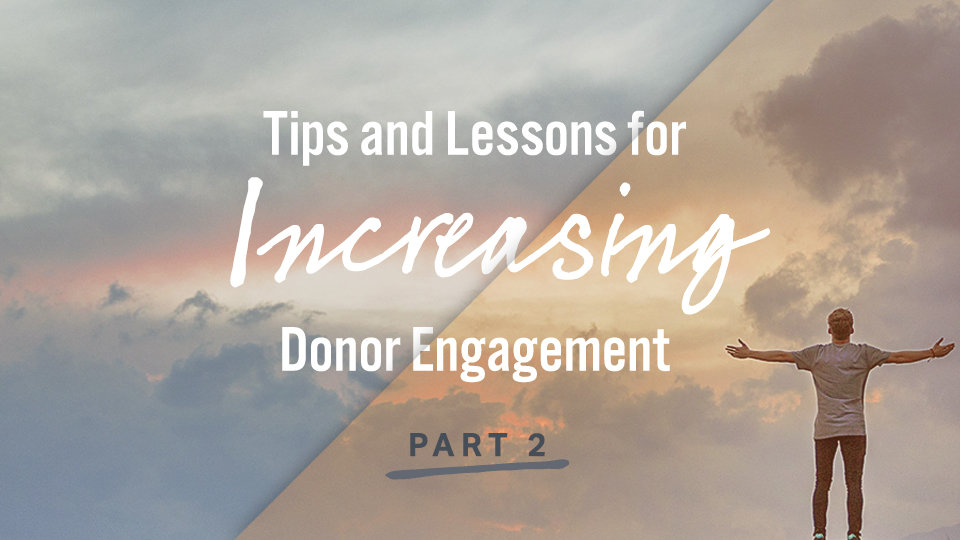6 Tips and Lessons for Increasing Donor Engagement: Part 2
By Pete Wilson
This is part two of the two-part series titled, "6 Tips and Lessons for Increasing Donor Engagement". To read it from the beginning, go to part one of the series.
In part one of this two-part series on tips for teaching and communicating about giving, we talked a little bit about the unfortunate reality that many pastors and ministry leaders face: while we understand the need to teach about money or be able to have conversations about it, giving and stewardship is something that makes us all feel a little uncomfortable.
I’m hoping these tips remind you of just how important it is to talk about this with your congregation or donors while also giving you a little more courage for the next time you have the opportunity to cast vision about the importance of giving. Let’s check out the last three tips.
4. You can’t shepherd hearts without shepherding pocketbooks.
Scripture tells us that money can be a competitor to God. There are many other areas of life that He could have called out as competitors, but He only singles out money. What should that tell us about the importance of regularly addressing this topic?
Jesus tells us, in Matthew 6:19-21, that our hearts are linked to where our treasure is. For many people, their treasure is their money and possessions. Most pastors agree that their primary responsibility is to disciple their people to grow spiritually. Why, then, would we avoid the topic of money, where so many of us struggle and find it to be the hardest area to turn over to God? Part of helping people shepherd their pocketbooks is about shepherding their attitudes. One of the key issues that keeps people from becoming fully devoted followers of Christ is the permissive attitude of entitlement that is rapidly growing in our churches.
You can’t be a disciple of Jesus and not be grateful. And you can’t be grateful for something you feel entitled to. The higher your sense of entitlement, the lower your sense of gratitude.
It’s all the overflow of a heart which begins to believe that something is “owed” to me and it keeps me from being fully present and appreciative of what I have. I have to remind myself often that if God never gives me one more thing in this life, I still owe Him everything. I’m wondering how different our churches and ministries would be if our members could grasp that truth.
5. Be crystal clear and acknowledge how people may feel.
When I’m teaching about this or in a one-on-one conversation about this topic, I like to start by acknowledging how some people feel. I actually say something like, “I realize that when a pastor or leader talks on money, it can appear self-serving. I know that some of you may be thinking, ‘I really don’t want to hear some preacher talk about money.’ I would just ask that you lower your guard a bit, listen to what I have to say, and then decide how you want to respond. It’s between you and God.”
Everyone sitting out in your congregation or across from you at a table has one question. Does this guy care about me? Andy Stanley says, “I don’t want something from you but I want something for you.” We have to understand that our care and love for our people is sometimes best displayed through discipling and teaching about truths that can propel them to new life.
After we acknowledge the apparent hurdles or misunderstandings, we must then be able to clearly and honestly communicate the reality of our finances, and what it actually means in practical terms that they can understand. Lack of understanding fogs potential.
Leaders are often baffled as to why people don’t give as faithfully and consistently as they should to their ministry. After years of studying this and watching ministries that are funded become more funded and ministries that are broke become more broke, I personally believe that the issue isn’t as much with the people. Most often, the issue starts with the leadership of the ministry lacking clarity in the ministry’s finances. Such as:
- Church leaders use words like “offering” and “tithe” and often times don’t explain what they actually mean.
- Ministry leaders often talk about their vision to expand the scope of the ministry and how crucial it is for people to give towards that vision, but they fail to explain why this expansion is so important.
- Leaders often assume people inherently understand how their ministry is funded.
- Non profits think the heart of their vision is strong enough to not have to approach the “why” for donors.
Essentially, we’ve stopped effectively communicating the “why” in terms that people understand. Understanding breeds action.
Many churches and non profits have stopped talking about what the budget needs actually are and instead are relying on a check to magically appear in the mail each time. Clear and honest communication is key to being intentional and encouraging people to be the stewards we are all designed to be. No shame in discussing. No ambiguity in the communicating. Then, you will start to see people begin to grasp what we have been losing grip of for a very long time.
6. Tie their donation to making a difference in this world
Jesus focused on something revolutionary: the least of these. This was a completely new idea to the people He was teaching. He demonstrated what it looked like to value every human life regardless of qualifications and it spread. As such, generosity and compassion were the hallmarks of the early believers, and it caught the attention of the pagan world.
For example, late in the second/early third century, when plagues swept through communities, the sick were thrown out and the gates were locked behind them. The early church believers were the only ones who responded with love and care for these people.
Rodney Stark says, “You can’t understand Christianity without understanding this early generosity. It was a counterculture that would not run away, but instead risk their own life to take care of people sick in the street. And people noticed.”
That’s how the church spread. They created a movement of generosity and compassion that the ancient world had not seen before, and it drew new believers to faith. Following their example, unconditional generosity is how we can point people to the unconditional love of God today, and it’s your duty as a pastor or leader to evoke that same response from your congregation or donor base.
As someone who led and launched two churches and a separate non profit over the course of the past 20 years, I’ll be the first to admit that donor development and retention is not the easiest item on the list of responsibilities. There are probably other one-on-one meetings you’d rather have and other topics you’d prefer speak on. I get it. But this is key to the formation and sustainability of your organization.
So if you’ve read all of this, it’s likely that you’re a little overwhelmed with where to start. And to be honest, these are just a few of the many practical ideas that I’ve encountered over the years on encouraging giving and building donor development. Every organization is vastly different and there is no “one size fits all” plan that can shift your giving culture from point A to point B. This is where we get excited because we have the incredible honor of helping ministries, churches and non profits find their unique road map to achieving their goals when it comes to funding.
In fact, we have a great free donor development checkup tool that you can acess right now to help you see what your next steps might be. And as always, remember you’re not alone in this. We’re glad to help anytime. Click below to start your assessment.














